7 Best Crypto Payment Gateways for Merchants in 2025
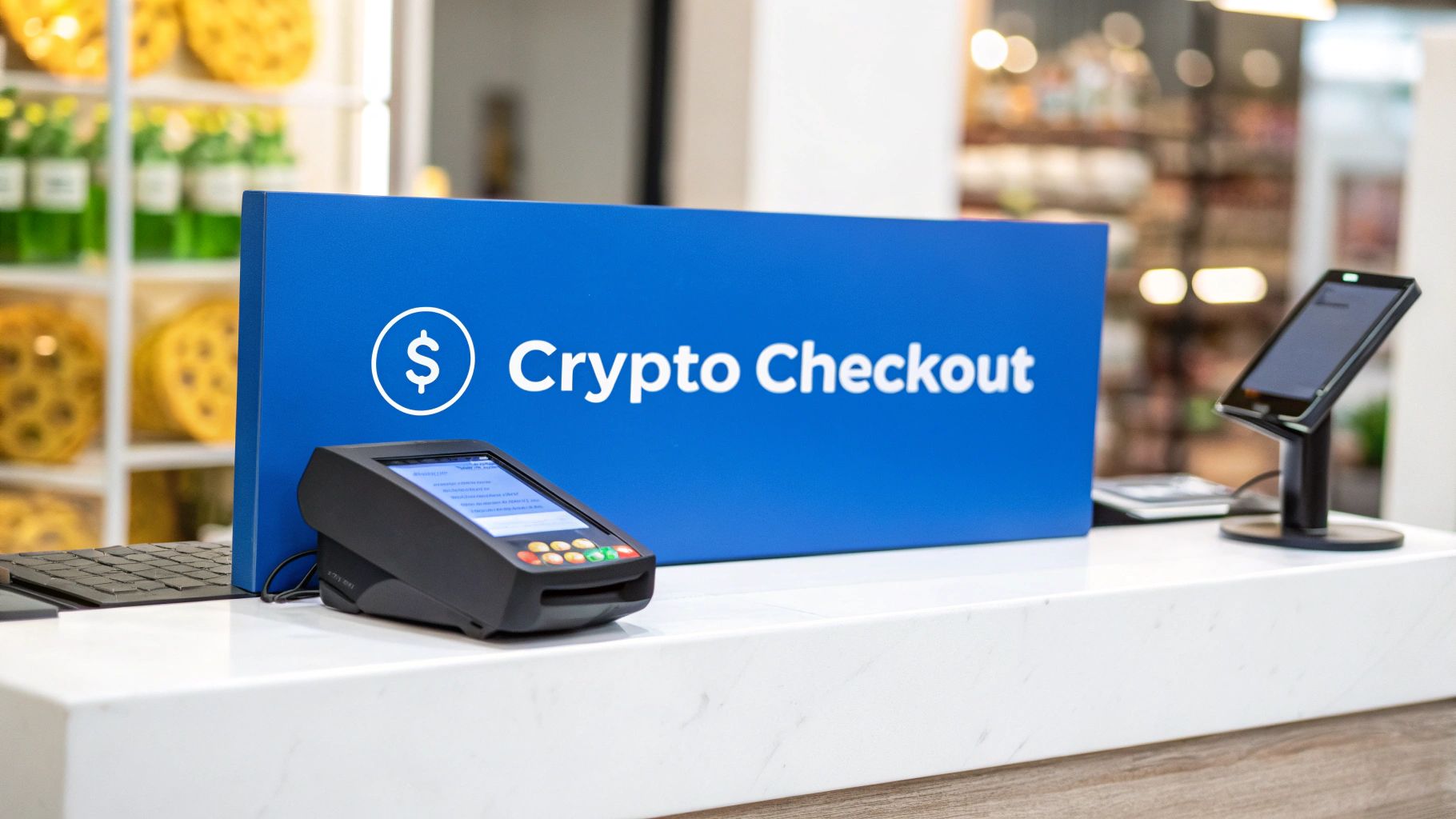
The global economy is rapidly embracing digital currencies, and businesses that adapt are poised for significant growth. Integrating a cryptocurrency payment gateway unlocks access to a new, tech-savvy customer base, reduces transaction fees compared to traditional banking, and eliminates the risk of fraudulent chargebacks. This transition might seem complex, but choosing from the best crypto payment gateways simplifies the process, enabling you to securely accept payments from anywhere in the world.
This guide explores the top platforms available today, breaking down their features, fee structures, and unique benefits to help you make an informed decision and future-proof your business. As you explore integrating these modern payment solutions, understanding the foundational technology that processes transactions, such as what a Point of Sale (POS) system is, can provide valuable context for how crypto gateways fit into your existing operations. We've curated a detailed comparison of the leading platforms, including ATLOS, BitPay, Coinbase Commerce, CoinGate, CoinPayments, NOWPayments, and BTCPay Server.
Our goal is to provide a clear, practical roadmap for any merchant, whether you're a hosting provider, VPN service, or operating in a high-risk industry like gaming or online casinos. We'll delve into what makes each gateway unique, from no-KYC solutions offering instant setup to established processors with comprehensive fiat settlement options. Each review includes screenshots and direct links to help you find the perfect fit for your operational needs and growth ambitions.
1. ATLOS Crypto Payment Gateway
ATLOS emerges as a premier choice for businesses seeking one of the best crypto payment gateways, particularly those prioritizing speed, autonomy, and brand control. It distinguishes itself by eliminating common industry friction points like mandatory KYC verification and lengthy account approvals. This streamlined, compliance-light approach allows merchants to integrate and begin accepting a wide array of cryptocurrencies-including Bitcoin, Ethereum, and more-almost instantaneously, a critical advantage in fast-paced markets.
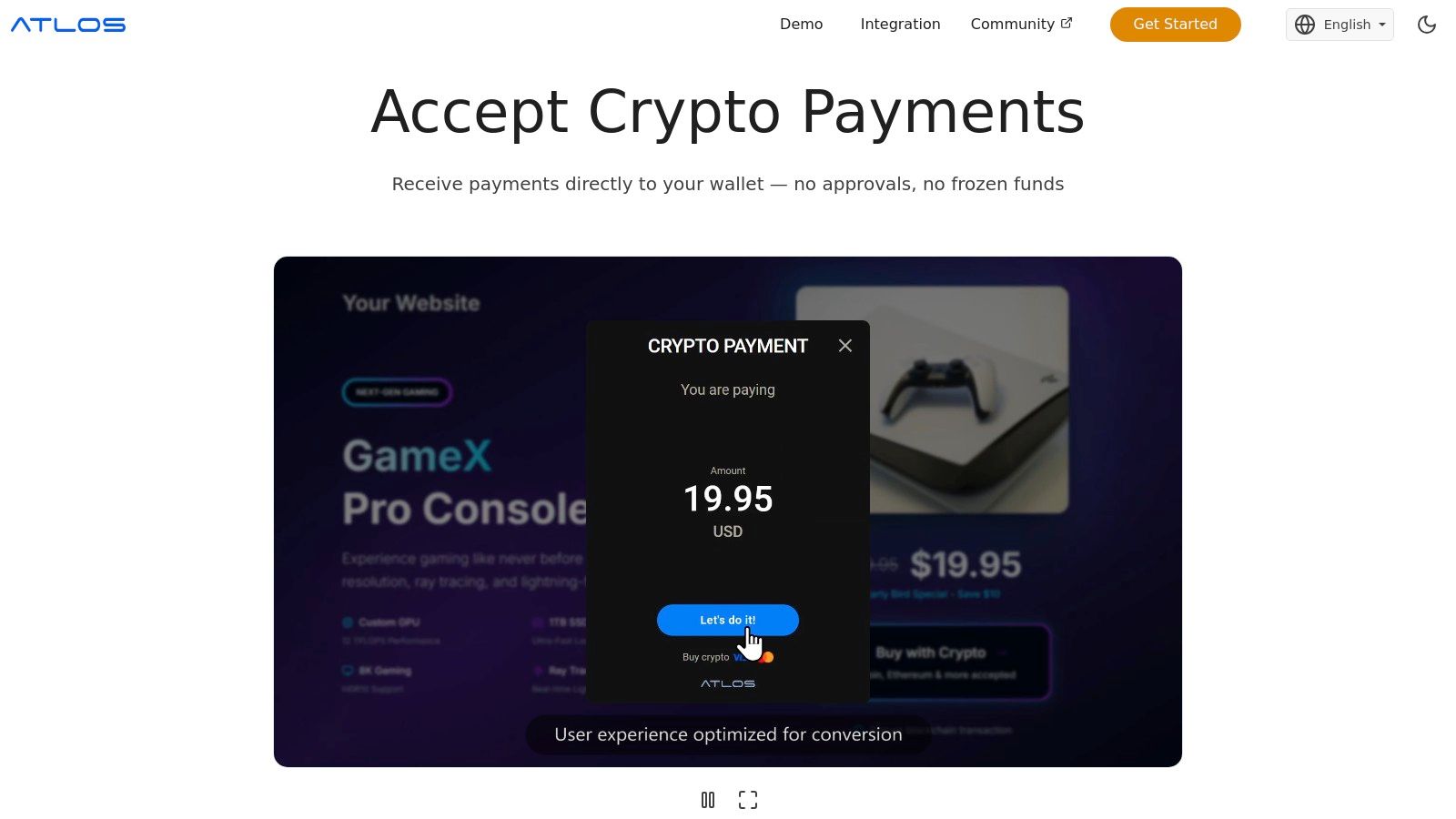
The platform is engineered around the core web3 principle of self-custody: "your keys, your crypto." Unlike custodial services that hold merchant funds, ATLOS facilitates direct, peer-to-peer payments straight to your personal crypto wallet. This non-custodial model grants merchants complete and immediate control over their assets, significantly enhancing security and mitigating third-party risk.
Key Features and Strategic Advantages
ATLOS is more than just a payment processor; it’s a comprehensive toolkit designed for modern digital commerce. Its feature set is tailored to provide flexibility and robust functionality, making it an adaptable solution for various business models.
- No KYC/Account Approval: The standout feature is its frictionless onboarding. By removing KYC requirements, ATLOS enables merchants to go live in minutes, not days, making it ideal for businesses that value privacy and rapid deployment.
- White-Label Customization: ATLOS offers a powerful white-label solution, allowing businesses to fully rebrand the payment interface. This ensures a seamless, on-brand customer experience, where the payment process feels like an integrated part of your own platform.
- Subscription & Recurring Payments: For businesses operating on a subscription model, ATLOS provides built-in support for recurring billing. This feature is essential for SaaS companies, content creators, and service providers who need to automate their revenue streams.
- Broad Cryptocurrency Support: The gateway supports a diverse range of popular cryptocurrencies, giving customers flexibility in how they pay and expanding the merchant's potential market reach globally.
- Simple E-commerce Integration: ATLOS is designed for easy integration with major e-commerce platforms and custom systems, minimizing the technical overhead for merchants to adopt crypto payments.
Expert Insight: The self-custody model offered by ATLOS is a game-changer for high-risk industries. By ensuring funds are never held by a third party, it provides an unparalleled level of financial autonomy and security that is often non-negotiable for sectors like online gaming, VPN services, and adult entertainment.
Ideal Use Cases and Target Audience
The unique architecture of ATLOS makes it an exceptional fit for industries that often face challenges with traditional payment processors. Its privacy-centric, no-KYC approach is particularly beneficial for:
- High-Risk Merchants: Businesses in sectors like online casinos, gaming, and adult entertainment can leverage ATLOS to process payments reliably without the risk of sudden account freezes.
- Privacy-Focused Services: VPN providers, hosting companies, and other digital services that champion user privacy can extend that ethos to their payment options.
- DAOs and Web3 Projects: Native web3 organizations can use ATLOS to manage treasury inflows and payments in a decentralized, self-sovereign manner.
While pricing is not publicly listed and requires direct inquiry, the value proposition is clear: ATLOS provides an advanced, secure, and highly customizable crypto payment gateway for businesses that refuse to compromise on speed or control.
| Feature Summary | Benefit |
|---|---|
| Onboarding Process | Instant (No KYC required) |
| Fund Custody | Self-Custody (Direct to your wallet) |
| Customization | Full White-Label Capabilities |
| Payment Models | One-time & Recurring |
| Primary Audience | High-Risk & Privacy-Centric Businesses |
Pros:
- Lightning-fast onboarding with no KYC or account approval
- Supports a wide range of popular cryptocurrencies
- Full white-label solution for complete brand integration
- Features recurring payments for subscription models
- Non-custodial design provides maximum security and control
Cons:
- Pricing information requires direct contact for a quote
- Fewer public case studies compared to established incumbents
Website: https://atlos.io
2. BitPay
BitPay is one of the pioneers in the crypto payment processing space. Launched in 2011, this U.S.-based gateway has built a strong reputation for reliability, security, and comprehensive compliance, making it a trusted choice for businesses looking to integrate cryptocurrency payments. It provides a full-service solution that allows merchants to accept a wide range of popular cryptocurrencies and stablecoins, then receive daily settlements directly in USD or other fiat currencies to their bank account. This seamless fiat conversion is a key feature for businesses that want the benefits of accepting crypto without the volatility risk.
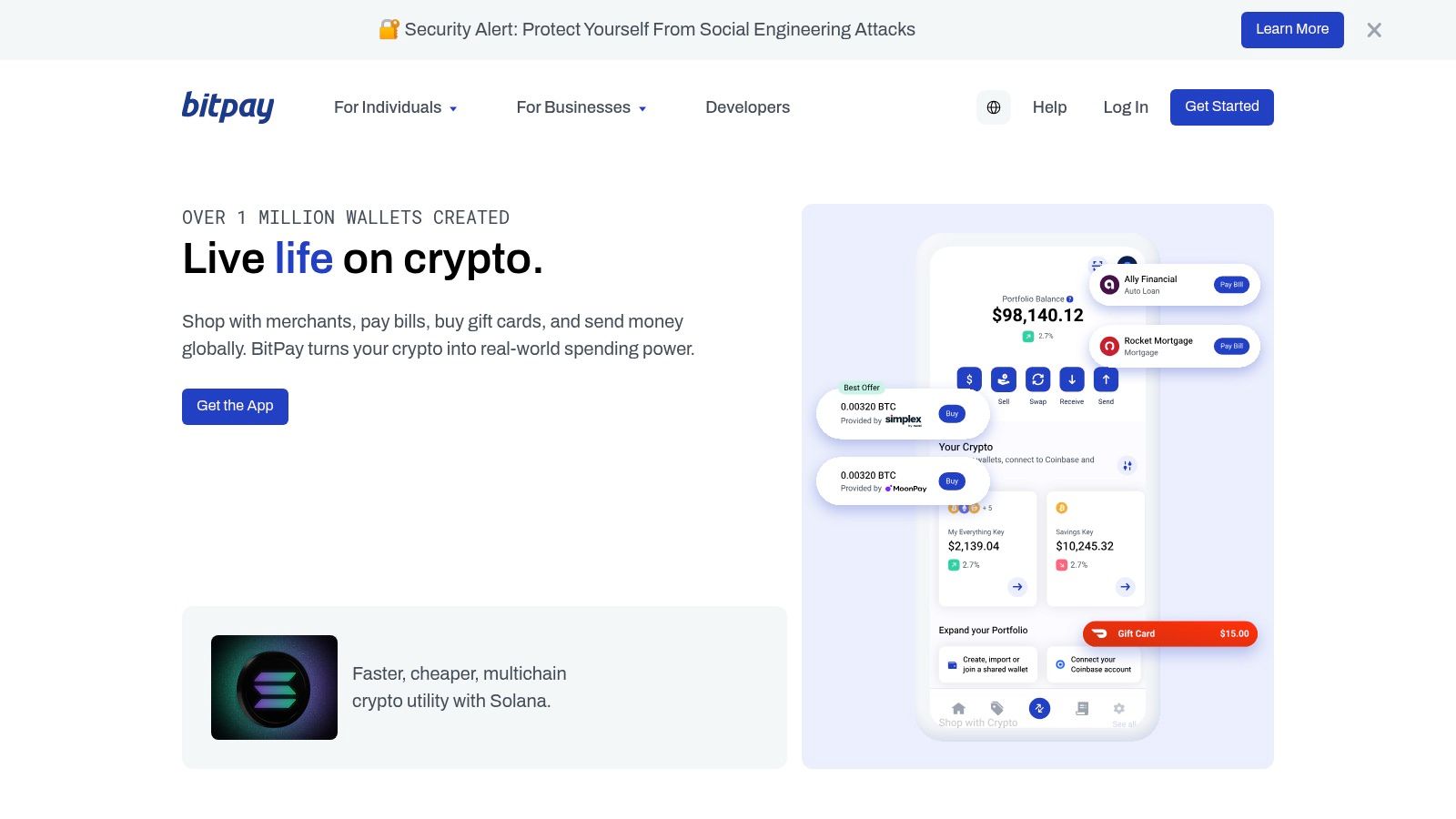
Key Features and Implementation
BitPay excels in offering a diverse set of tools to fit various business models, making it one of the best crypto payment gateways for both online and offline merchants. Its product suite is designed for easy integration and management.
- Payment Acceptance: Merchants can accept Bitcoin (BTC), Ethereum (ETH), and a curated list of leading altcoins and ERC-20 stablecoins like USDC and DAI. Crucially, it also supports the Lightning Network for near-instant, low-cost Bitcoin transactions.
- Integration Options: BitPay provides robust e-commerce plugins for major platforms like Shopify, WooCommerce, and Magento. For custom solutions, developers can leverage its well-documented API. It also offers hosted checkout pages, email invoicing, and donation buttons.
- Fiat Settlement: One of BitPay’s core strengths is its reliable fiat settlement. Businesses in supported countries can receive daily bank deposits in USD, EUR, and other local currencies, completely shielding them from crypto price fluctuations.
- Retail and POS: For brick-and-mortar businesses, BitPay provides point-of-sale solutions that allow customers to pay by scanning a QR code with any compatible crypto wallet.
Pricing and User Experience
BitPay uses a transparent, tiered pricing model. The standard plan for most merchants is a flat 1% transaction processing fee. This simplicity is appealing, as there are no monthly fees or setup costs. However, merchants in certain high-risk industries or those requiring advanced features may fall into a higher tier with a 2% + $0.25 fee. A potential drawback is the "network cost" fee applied to some BTC invoices, which is passed to the customer to cover blockchain miner fees during times of high congestion. This is a separate fee from BitPay's processing charge.
Practical Tip: To minimize transaction costs for customers, encourage the use of the Lightning Network for Bitcoin payments or stablecoins, as these typically have much lower network fees than on-chain BTC transactions.
Website: https://bitpay.com
3. Coinbase Commerce
Coinbase Commerce is a powerful crypto payment solution from one of the most recognized and regulated names in the cryptocurrency industry. Launched by the U.S.-based exchange Coinbase, this platform is tailored for merchants who want a straightforward, secure, and compliant way to accept on-chain crypto payments. Its primary focus is on simplifying the process for both merchants and customers, leveraging the trust and robust infrastructure of the broader Coinbase ecosystem. The platform is particularly well-suited for businesses looking to tap into the stability and speed of USDC payments on cost-effective blockchain networks.
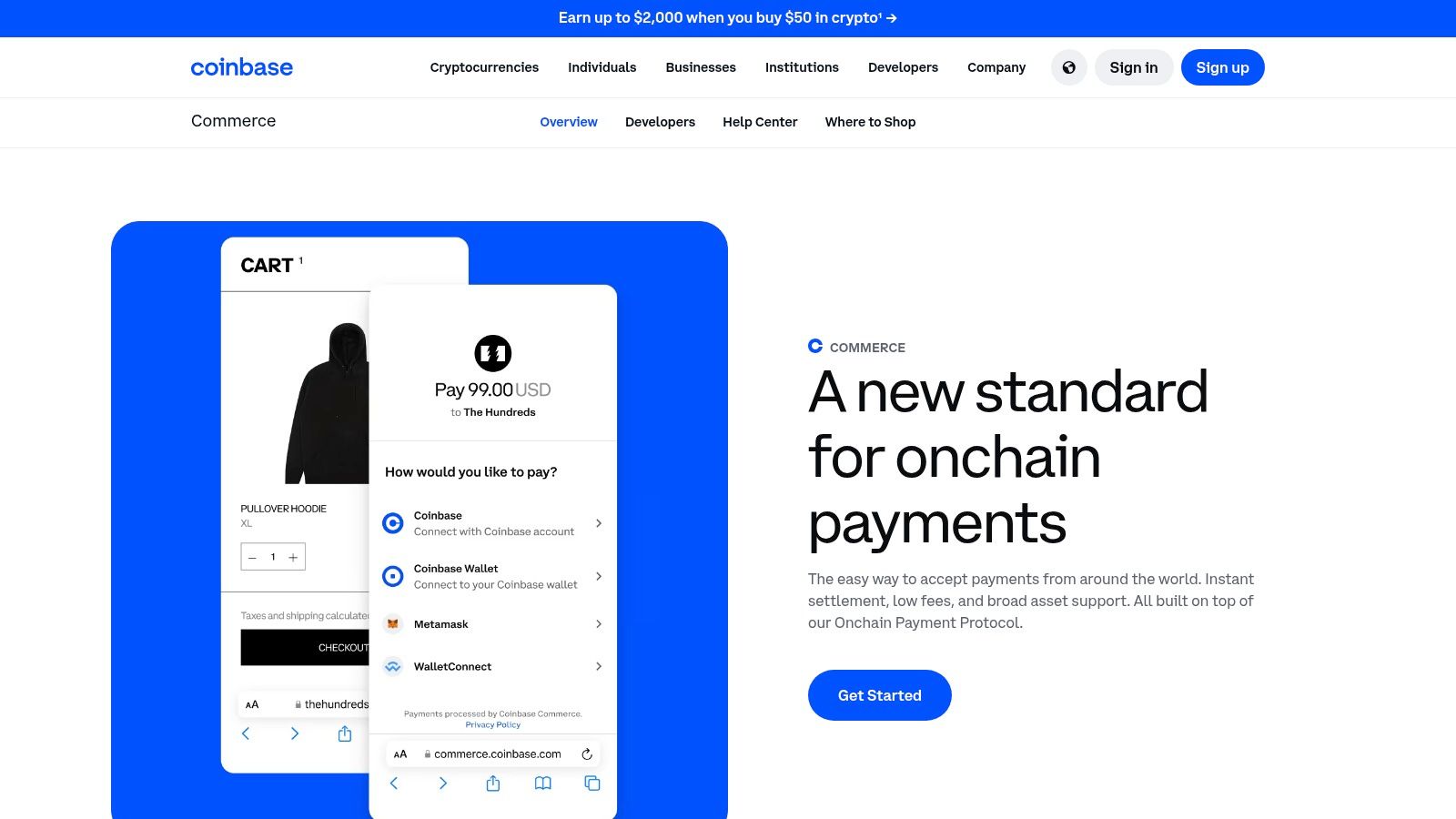
Key Features and Implementation
Coinbase Commerce distinguishes itself by offering a streamlined, developer-friendly experience that prioritizes stablecoin transactions, making it one of the best crypto payment gateways for U.S.-based businesses seeking predictability. The implementation process is designed to be as frictionless as possible.
- Payment Acceptance: The platform supports a curated selection of cryptocurrencies, including Bitcoin (BTC), Ethereum (ETH), and several others. However, its primary strength and focus is on facilitating payments with USDC on multiple blockchains like Ethereum, Polygon, and Base.
- Integration Options: Merchants can easily integrate Coinbase Commerce into their existing stores with official plugins for major e-commerce platforms like Shopify and WooCommerce. For custom builds and more advanced use cases, the Coinbase Developer Platform provides a robust API and extensive documentation.
- On-Chain Payment Handling: A standout feature is its intelligent on-chain protocol that automatically handles payment discrepancies. If a customer sends a slight overpayment or underpayment, the system can reconcile it without requiring manual intervention, improving the user experience.
- Merchant Control: Unlike some gateways that custody funds, Coinbase Commerce allows merchants to connect their own self-custody wallet or a Coinbase account, giving them direct control over their received funds.
Pricing and User Experience
Coinbase Commerce employs a simple and transparent pricing structure that is easy for merchants to understand. The platform charges a flat 1% transaction fee for all successful payments. There are no setup fees, monthly charges, or hidden spreads, which makes it highly competitive. This fee is deducted directly from the transaction amount, and the remainder is settled to the merchant's connected wallet or account. The user interface is clean and intuitive, reflecting the polished design of the main Coinbase platform.
Practical Tip: For businesses that prioritize stability and want to avoid crypto volatility, structuring your checkout to default to or encourage USDC payments on a low-fee network like Polygon or Base can be a highly effective strategy. This provides customers with a fast, cheap payment option while ensuring you receive a stable value.
Website: https://commerce.coinbase.com
4. CoinGate
CoinGate is a versatile Lithuanian-based crypto payment processor that has gained significant traction for its straightforward pricing and extensive cryptocurrency support. Established in 2014, it serves businesses globally, offering a robust suite of tools that cater to both online e-commerce stores and brick-and-mortar operations. A key differentiator for CoinGate is its exceptionally broad coin support and flexible settlement options, making it a strong contender among the best crypto payment gateways for merchants who want to offer maximum payment choice to a global customer base.
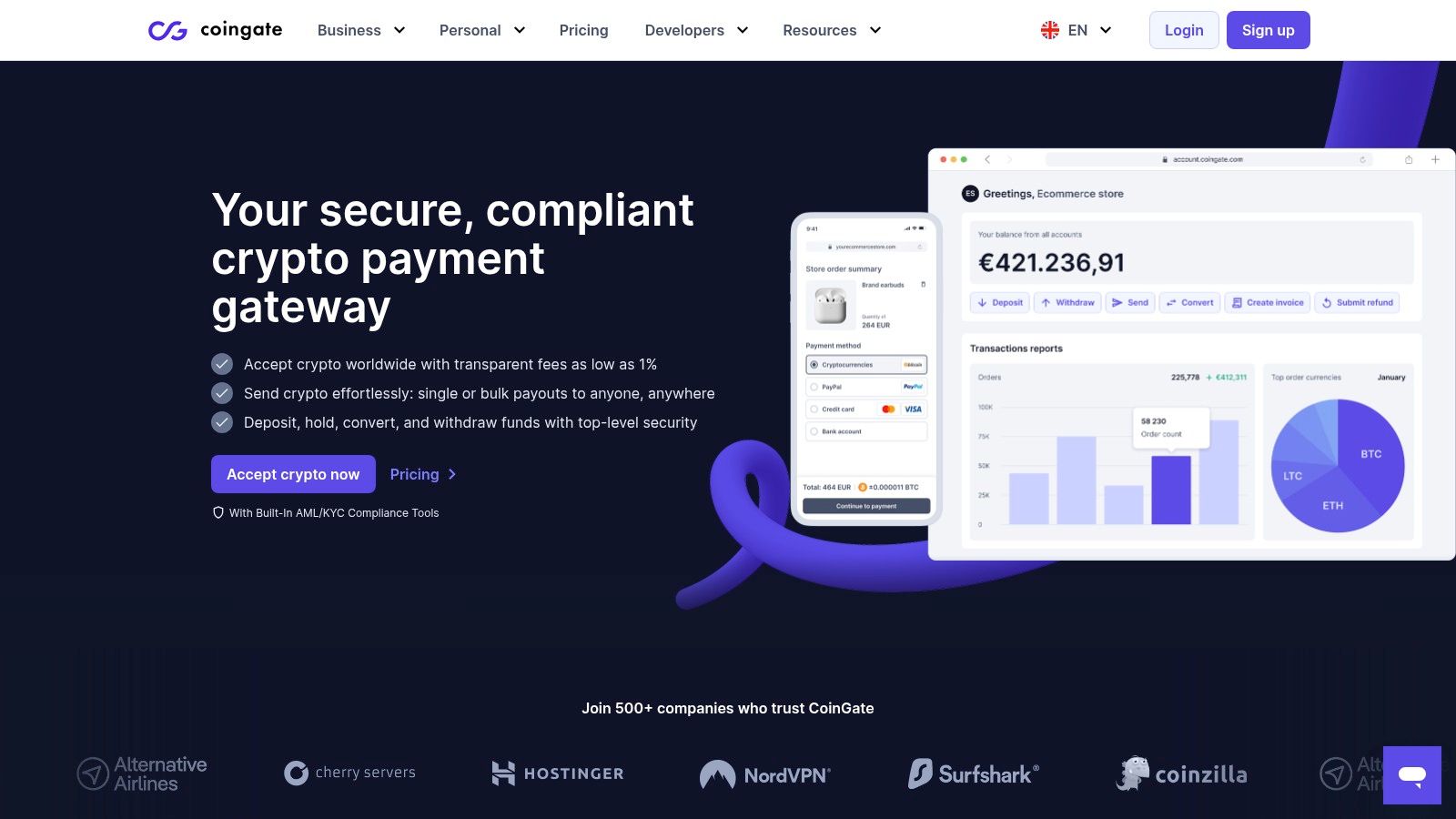
Key Features and Implementation
CoinGate provides a comprehensive platform designed for simplicity and adaptability. Its services are particularly appealing to merchants in high-risk industries, DAOs, and gaming, who value both flexibility and a wide array of payment options.
- Extensive Coin Support: Merchants can accept payments in over 70 different cryptocurrencies, including major players like Bitcoin (BTC), Ethereum (ETH), Solana (SOL), and popular stablecoins like USDC. Crucially, it also offers full support for the Bitcoin Lightning Network for fast, low-cost transactions.
- Flexible Integration Tools: CoinGate offers dedicated plugins for popular e-commerce platforms like WooCommerce, Magento, and PrestaShop. For custom integrations, businesses can use its well-documented API or opt for simpler solutions like payment buttons and email billing.
- Settlement Options: Businesses can choose to receive settlements in fiat currencies (USD for U.S. merchants, EUR for European merchants) directly to their bank account. Alternatively, they can opt to receive payouts in crypto, such as Bitcoin or a stablecoin like USDT, offering a way to hedge against volatility or build crypto holdings.
- Point-of-Sale (POS) System: For physical retail stores, CoinGate provides a web-based POS application that works on any internet-connected device. It generates a simple QR code for customers to scan, making in-person crypto payments seamless.
Pricing and User Experience
CoinGate's primary appeal lies in its transparent and competitive pricing. Most merchants qualify for a simple, flat 1% transaction processing fee, with no setup costs or recurring monthly charges. This clear pricing model makes it easy for businesses to predict costs without worrying about hidden fees. While the core processing is straightforward, some ancillary services, like certain crypto-to-crypto exchanges or specific payout methods, may have additional small fees.
The user interface is clean and user-friendly, and the availability of a sandbox environment allows developers to test their integrations thoroughly before going live. The main potential hurdle for some businesses could be regional variations in fiat settlement, which depend on local banking partnerships and the merchant's verification status.
Practical Tip: Use the email billing feature for custom orders or B2B invoices. You can create a one-time invoice and send a payment link directly to your client, allowing them to pay with their preferred cryptocurrency without needing a complex checkout process.
Website: https://coingate.com
5. CoinPayments
CoinPayments has carved out a unique niche in the crypto payment processing landscape by offering one of the most extensive lists of supported cryptocurrencies available. Founded in 2013, this gateway is designed for merchants who prioritize choice and flexibility, allowing them to accept payments in thousands of different digital assets. This massive coin support, combined with a built-in multi-coin wallet and conversion features, makes it an attractive all-in-one solution for businesses catering to a diverse crypto-native audience.
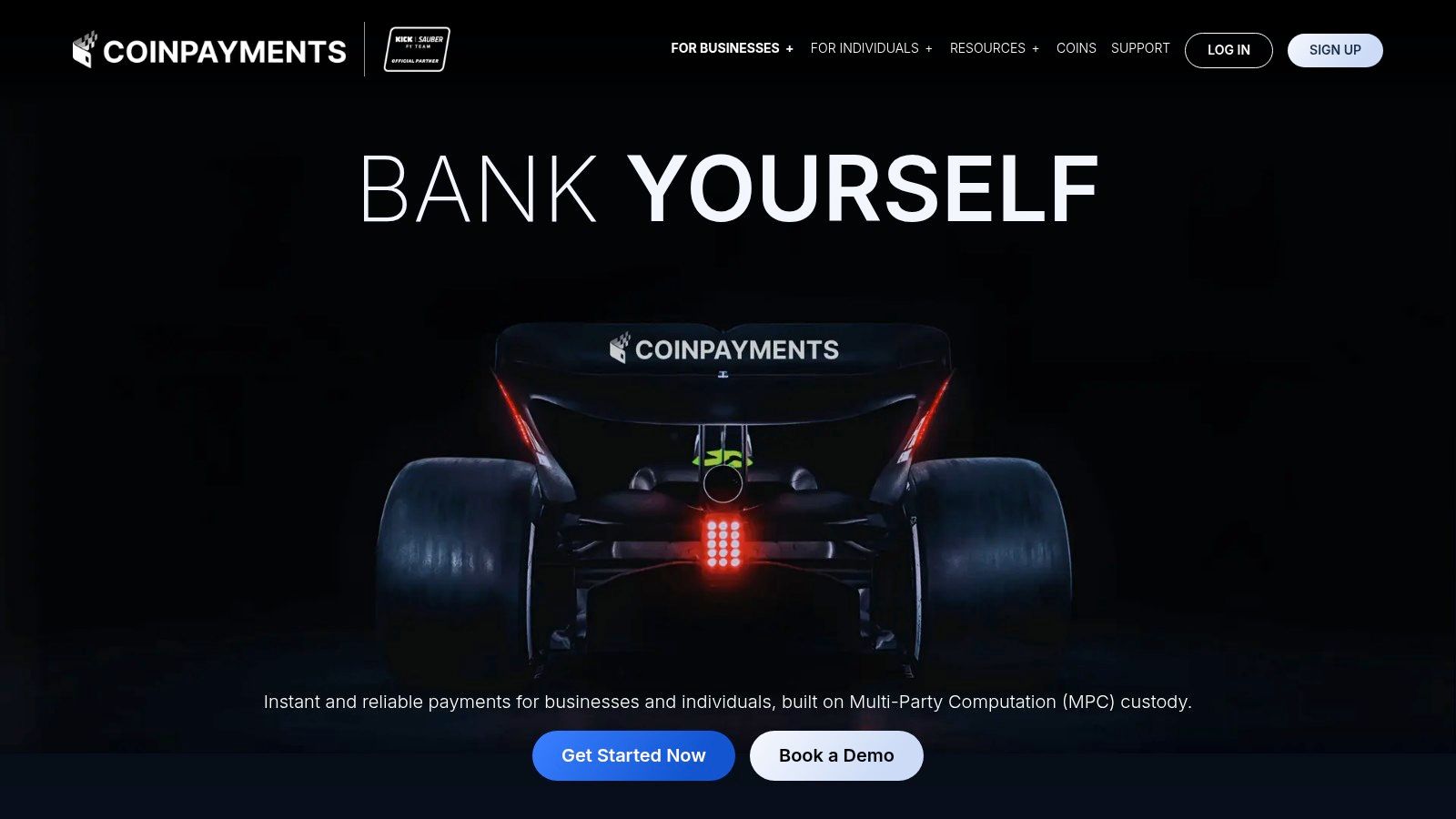
Key Features and Implementation
CoinPayments excels at providing a versatile platform that combines payment processing with digital asset management. Its extensive support for both established coins and emerging altcoins makes it a standout choice among the best crypto payment gateways for merchants with a global, crypto-savvy customer base.
- Extensive Coin Support: This is CoinPayments' defining feature. Merchants can accept payments in thousands of cryptocurrencies, far exceeding the selection offered by most competitors. This is ideal for niche communities and projects with their own native tokens.
- Integration and Merchant Tools: It provides plugins for popular e-commerce platforms like Shopify, WooCommerce, OpenCart, and Magento. For custom integrations, there is a comprehensive API. The platform also includes features like invoicing, donation buttons, and a customizable "Pay by Name"
$PayByNametag for easy payments. - Auto-Conversion and Payouts: Merchants can choose to automatically convert incoming crypto payments into a preferred coin (like BTC or ETH) or stablecoin (like USDT or USDC) to mitigate volatility. This allows for flexible asset management directly within the platform.
- Optional Hosted Wallet: The service includes a built-in multi-currency wallet where merchants can store their earnings. This can simplify operations but also introduces custodial risk, which merchants should consider based on their security model.
Pricing and User Experience
CoinPayments is known for its competitive and straightforward pricing structure. The standard processing fee is a low 0.5% for all incoming transactions. This fee is consistent across the board, making it easy to predict costs. However, it's crucial to understand that additional fees apply for other services. For example, asset conversions or withdrawals will incur separate network and platform fees.
A potential challenge for new users is navigating the documentation, which is spread across a legacy platform and a newer interface. This can sometimes make the initial setup more complex. The platform also offers paid setup assistance for businesses that require dedicated support. The user interface combines wallet and merchant functionalities, which is powerful but may require a learning curve for those only familiar with traditional payment gateways.
Practical Tip: To streamline your accounting and minimize fees, utilize the auto-conversion feature to consolidate payments from various altcoins into a single stablecoin like USDC. This protects you from the volatility of lesser-known assets and simplifies the withdrawal process.
Website: https://www.coinpayments.net
6. NOWPayments
NOWPayments has carved out a niche as a highly versatile and non-custodial crypto payment gateway, appealing to businesses that prioritize control over their funds. Launched by the team behind the ChangeNOW instant crypto exchange, it offers one of the most extensive lists of supported cryptocurrencies on the market. The platform’s core philosophy is simplicity and transparency, allowing merchants to accept payments directly into their own wallets, thereby minimizing counterparty risk. This non-custodial approach, combined with competitive and straightforward fees, makes it an excellent choice for businesses across various sectors, including high-risk industries.
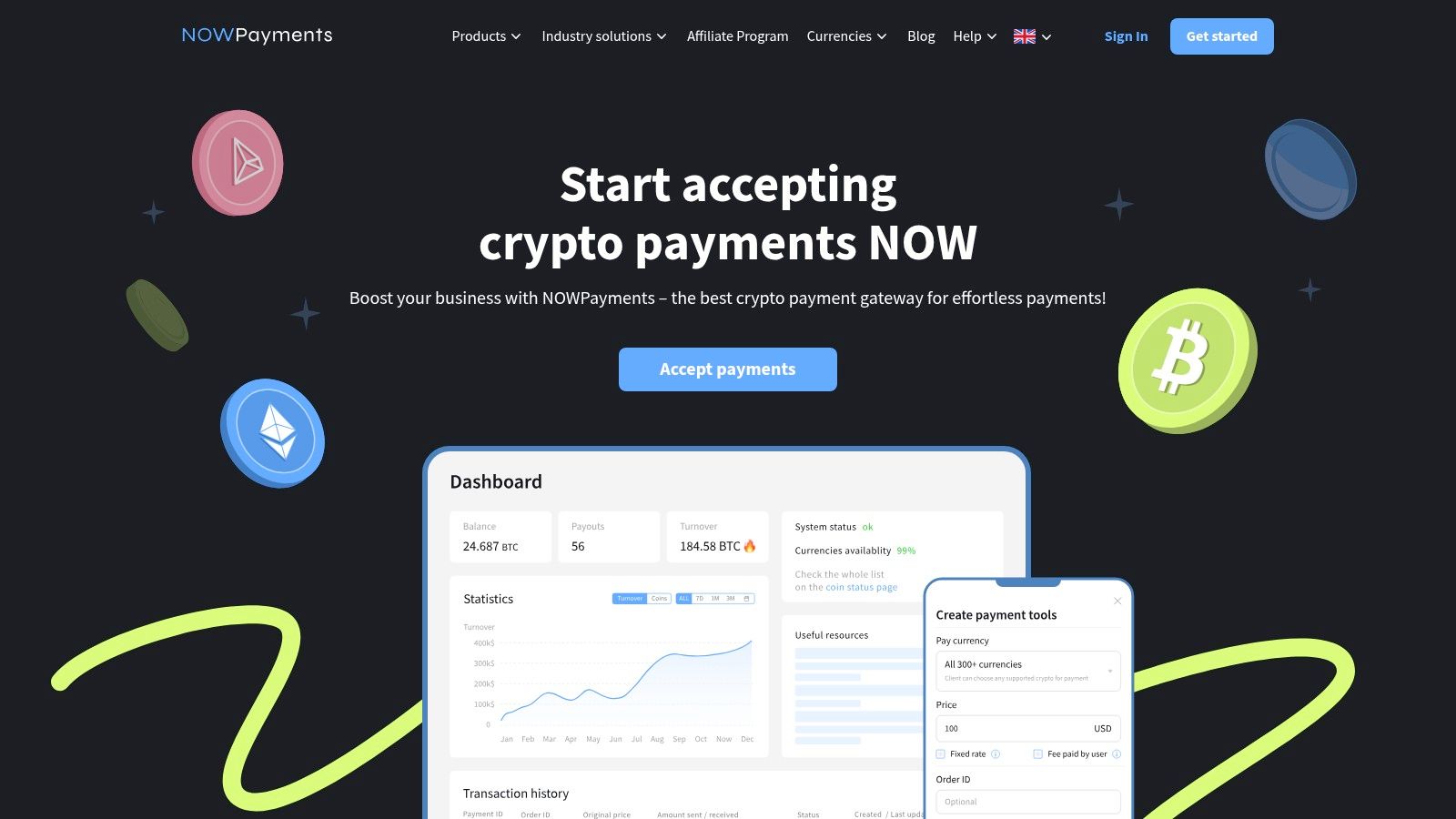
Key Features and Implementation
NOWPayments stands out as one of the best crypto payment gateways due to its exceptionally broad coin support and flexible, easy-to-implement tools. Its non-custodial nature is a major differentiator, giving merchants direct ownership of incoming funds.
- Extensive Coin Support: The platform supports over 150 different cryptocurrencies, including major coins like Bitcoin and Ethereum, a vast array of altcoins, and multiple stablecoins. This wide selection caters to diverse customer bases and niche communities.
- Non-Custodial by Default: Merchants connect their own crypto wallets and receive payments directly. This eliminates reliance on a third-party custodian and gives businesses full control. An optional custody feature is available for those who wish to reduce transaction costs by batching withdrawals.
- Integration and Tools: NOWPayments provides plugins for major e-commerce platforms like Shopify, WooCommerce, OpenCart, and PrestaShop. It also offers donation buttons, payment links, and a well-documented API for custom integrations. A mass payouts feature is available for businesses that need to send crypto to multiple recipients.
- Fiat Conversion: For businesses wanting to avoid volatility, NOWPayments facilitates fiat conversions and settlements in EUR and GBP through a partnership with a third-party service, although availability is subject to country restrictions.
Pricing and User Experience
NOWPayments is known for its transparent and competitive pricing model, which is one of its most attractive features. The standard processing fee starts at a low 0.5% for payments where the customer pays and the merchant receives the same cryptocurrency. If automatic coin conversion is used (e.g., customer pays in BTC, merchant receives ETH), the fee starts from 1%. An additional network fee is charged to the customer to cover the cost of the blockchain transaction.
Practical Tip: To keep your costs at the absolute minimum, use the non-custodial, same-currency payment option. This leverages the 0.5% base fee and ensures you maintain full control over your private keys from the moment of the transaction.
Website: https://nowpayments.io
7. BTCPay Server
BTCPay Server stands apart as a unique and powerful solution in the crypto payment gateway space. Unlike custodial services, it is a free, open-source, and self-hosted payment processor, giving merchants complete control over their funds and infrastructure. Launched in 2017, it was created by developers seeking a censorship-resistant alternative to centralized processors. It allows businesses to receive Bitcoin and other cryptocurrencies directly to their own wallets without intermediaries, fees, or KYC requirements, embodying the core principles of decentralization and financial sovereignty.
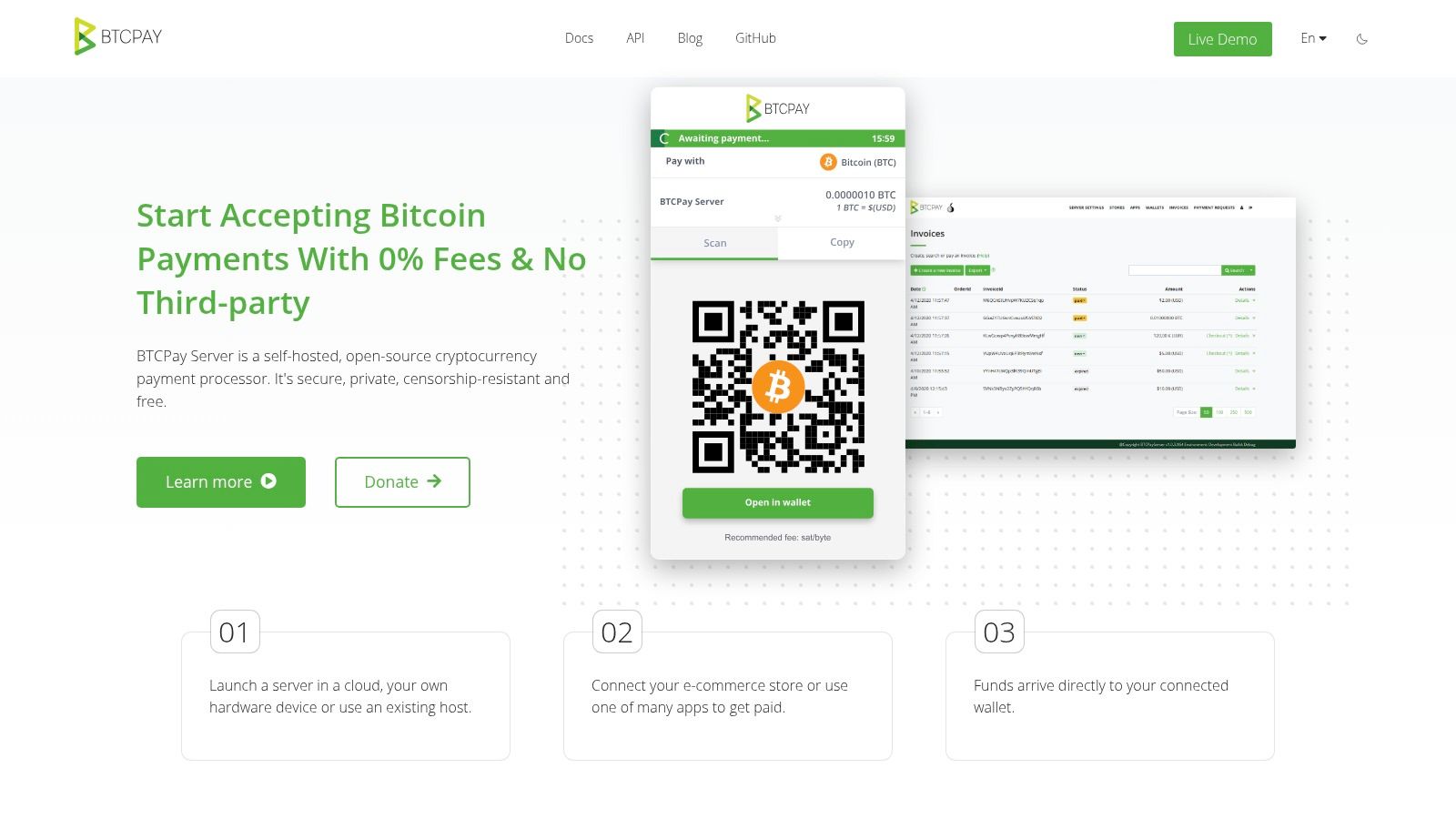
Key Features and Implementation
BTCPay Server is designed for users who prioritize control and privacy, offering a suite of tools that can be customized to fit diverse needs. While it requires more technical effort to set up, its flexibility is unmatched, making it one of the best crypto payment gateways for privacy-conscious businesses.
- Complete Sovereignty: As a self-hosted platform, you control your own private keys. There is no third-party risk, and funds are sent directly from the customer to your wallet. This eliminates the possibility of frozen funds or account suspensions.
- Integration and Apps: It offers plugins for major e-commerce platforms like WooCommerce, Shopify, and Magento. Its real power lies in its built-in app ecosystem, which includes tools for point-of-sale (POS) terminals, crowdfunding campaigns, and creating simple payment buttons.
- Lightning Network Support: BTCPay Server is a leader in Lightning Network adoption, allowing for instant, near-free Bitcoin transactions. Merchants can run their own Lightning node directly within their BTCPay instance for full non-custodial use.
- Deployment Options: Users can deploy BTCPay Server on their own hardware (like a Raspberry Pi), a Virtual Private Server (VPS), or through third-party cloud hosting providers that offer one-click installation.
Pricing and User Experience
BTCPay Server is completely free to use, with zero processing fees or monthly charges. The only costs are the standard blockchain network fees (paid by the customer) and the cost of hosting your server instance, which can be as low as a few dollars per month. This cost-effective model is a major draw for businesses of all sizes.
The primary trade-off is the user experience during setup. It requires technical knowledge to deploy, configure, and maintain the server, including managing security and backups. Additionally, since it's a crypto-to-crypto solution, converting funds to fiat currency requires a separate process using an exchange or P2P service. The strong community and extensive documentation provide excellent support for navigating these challenges.
Practical Tip: For an easier setup, consider using a one-click deployment option from a hosting provider that specializes in BTCPay Server. This simplifies the initial installation and allows you to focus on configuration rather than server management.
Website: https://btcpayserver.org
Top 7 Crypto Payment Gateways Comparison
| Payment Gateway | Implementation Complexity | Resource Requirements | Expected Outcomes | Ideal Use Cases | Key Advantages |
|---|---|---|---|---|---|
| ATLOS Crypto Payment Gateway | Moderate - easy integration with e-commerce platforms | Low - no KYC or account approval needed | Fast crypto payments with high security | High-risk sectors, subscription models | No KYC, wide crypto support, white-label customization |
| BitPay | Low - ready-to-use plugins and POS systems | Moderate - compliance and KYC processes | Reliable crypto-to-fiat settlements | Established merchants, U.S. market | Strong compliance, daily USD settlement |
| Coinbase Commerce | Low - seamless integrations with Shopify and WooCommerce | Low - focuses on USDC stablecoin payments | Transparent fee structure, reliable stablecoin payments | U.S. merchants focusing on stablecoins | Transparent pricing, strong U.S. compliance |
| CoinGate | Low to moderate - API and plugins available | Moderate - supports fiat and crypto settlements | Flexible settlement options, broad coin coverage | Merchants needing multiple settlement choices | Flat fee, BTC Lightning support, various integrations |
| CoinPayments | Moderate - multiple plugins and hosted wallet | Moderate - some paid setup services | Broad cryptocurrency acceptance | Merchants requiring wide coin and token support | Very broad coin coverage, low base fees |
| NOWPayments | Low - simple setup via API and payment buttons | Low - non-custodial by default | Transparent low fees, flexible payments | Merchants seeking easy setup and CMS integrations | Clear pricing, wide coin support, optional custody |
| BTCPay Server | High - self-hosted setup and maintenance required | High - technical skills needed | Full control with no processor fees | Tech-savvy users wanting full sovereignty | Free, open-source, privacy-focused, no KYC |
Making the Right Choice for Your Crypto-Powered Future
Navigating the landscape of cryptocurrency payment processing can feel complex, but as we've explored, the market is rich with diverse and powerful solutions. The journey to selecting one of the best crypto payment gateways is not about finding a single "best" option, but about identifying the platform that aligns perfectly with your specific business model, technical capabilities, and strategic vision. Each gateway we've detailed offers a unique blend of features, catering to different priorities across the digital commerce spectrum.
Your final decision hinges on a careful evaluation of your core needs. For businesses operating in traditional e-commerce, the regulatory clarity and brand recognition of established players like BitPay or Coinbase Commerce might provide the necessary trust and stability. Meanwhile, platforms such as CoinGate, CoinPayments, and NOWPayments excel by offering an expansive library of supported cryptocurrencies and competitive fee structures, making them ideal for merchants aiming to capture a broad, crypto-native audience. The key is to look beyond the surface and match the gateway’s strengths to your operational requirements.
Key Factors for Your Final Decision
As you move from evaluation to implementation, zero in on the factors that will have the most significant impact on your daily operations and long-term growth. Don't let a single feature, like a low transaction fee, overshadow other critical aspects.
Consider this checklist before making your commitment:
- Custody and Control: Do you prefer a non-custodial gateway where you hold your private keys, like ATLOS or BTCPay Server, offering maximum security and censorship resistance? Or are you comfortable with a custodial model where the provider manages keys for convenience, as with most other platforms?
- Target Audience and Industry: Your business type is paramount. High-risk merchants, hosting providers, and DAOs have fundamentally different needs than a standard online retailer. Gateways like ATLOS are purpose-built for these sectors, offering no-KYC, instant settlement, and privacy features that are non-negotiable in these industries.
- Settlement and Payouts: How do you want to receive your funds? Do you need automatic conversion to fiat currency to manage cash flow and avoid volatility, or do you plan to hold crypto assets as part of your treasury strategy? Ensure the gateway's settlement options match your financial plan.
- Technical Integration and Support: Evaluate the ease of integration. Is there a simple plugin for your e-commerce platform (like WooCommerce or Shopify), or will you need developer resources to use an API? Furthermore, what level of customer support will you require? An open-source, self-hosted solution like BTCPay Server offers community support, while commercial platforms provide dedicated service channels.
Implementing Your Gateway for Success
Once you've chosen your provider, the implementation phase is your opportunity to set the foundation for a seamless customer experience. For instance, if you select a versatile option like NOWPayments, explore its invoicing and donation button features to expand beyond simple checkout payments. If you opt for the self-sovereign route with BTCPay Server, dedicate time to properly configure your server for optimal security and performance.
For businesses that prioritize branding and a frictionless user journey, a white-label solution is invaluable. A gateway such as ATLOS allows you to embed the payment processor directly into your existing checkout flow under your own brand, eliminating jarring redirects and building customer trust. This deep integration ensures the crypto payment process feels like a natural part of your ecosystem, not a bolted-on third-party service. By strategically aligning your chosen gateway with your operational workflow, you position your business to not only accept a new form of payment but to thrive in the expanding digital economy.
Ready to embrace a payment solution built for privacy, speed, and complete control? ATLOS Crypto Payment Gateway provides a non-custodial, no-KYC platform designed for businesses that demand sovereignty over their funds. Explore how our white-label features and instant settlement can empower your operations by visiting the ATLOS Crypto Payment Gateway website today.